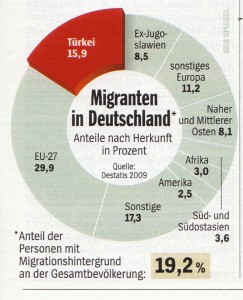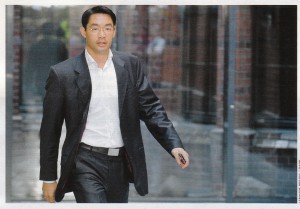The Mirror, Vol. 14, No. 683
There are at present two issues which dominate the media in Germany since my arrival 10 days ago: the decision not to phase out the use of nuclear energy in a couple of years – as had been decided by the former government – a decision now reversed during a high level meeting between the head of government with representatives of the energy industry, but surprisingly enough without the participation of the Minister of the Environment. The other issue is abroad and emotional discussion about the role of migrants from other countries.
The latter discussion was triggered by the publication of a book by Thilo Sarazzin, a member of the board of directors of the biggest German bank – Deutsche Bank – with the provocative title: Deutschland schafft sich ab – Germany is abolishing itself.
The percentage of persons in Germany with a “migrant’s background” – either born abroad, or having at least one parent who is a foreigner – is 19.2%, that is one among every five persons! The largest group, with 15.9% among the people with a “migrant’s background” come from Turkey. And a large number of the Turkish people are not well integrating in terms of being able to use the German language even after many years – and some of their cultural traditions, especially relating to the role of women in family and society, are considered to be contrary to basic human rights and freedoms guaranteed in the German constitution. This leads also to deep conflicts even within some of the immigrant communities – up to so called “honor killings” of women by their male relatives, if they enter into relations with males contrary to the rules of their own family traditions. About 45% of Muslims with a migrant’s background have applied and received German citizenship.
While the positions taken by Thilo Sarazzin were widely criticized in the beginning – Sarazzin finally announced to resign from his position – he found also more and more positive responses. Many political groupings admit that there has not been sufficient support for the education of the children of immigrants, so that they were not able to profit from schooling, not sufficiently assisting their social integration.
At least this wide public debate triggered is positive. New effort will be made to improve the situation.
But even if better educational and economic solutions can be developed, there are also emotional and irrational reasons affecting the situation of people with immigrant backgrounds negatively..
The international economic climate is of course also influencing all considerations about the future – including the well established “social net” of unemployment and retirement and pension and health care services.
When I saw, for the first time, a picture of the Minister for Health of the Federal Republic of Germany in a newspaper, I thought: Did the newspaper print the wrong picture with the report? Who was this dynamic young man from Asia? I was surprised. But the name of Dr. Philipp Rösler [Roesler] is clearly German. When I did some more research, I found an interesting history, which I consider worth while to share also in a wider Cambodian context – relating to the neighboring country of Vietnam.
Philipp Rösler was born 1973 in the province presently called Soc Trang [Sóc Trăng – Srok Kh’leang formerly called in Khmer] in Vietnam. He came to Germany at the age of nine months, adopted from an orphanage not far from Ho Chi Minh City by a German couple who had already two children of their own. He grew up in Germany, in Hamburg, and Hanover, where he graduated from high school in 1992. He became a soldier in the German Federal Military – the Bundeswehr – where he had the opportunity to studied medicine, and he earned the degree of Doctor of Medicine in 2002. He joined the Liberal Democratic Party, was selected to serve as Minister for Economics and Deputy Prime Minister of the German state of Lower Saxony, and is Federal Minister of Health since October 2009. That he was entrusted with the Ministry of Health at the age of 36 as the youngest of the 19 ministers shows not only that the political leadership had confidence in his qualifications, but – more important I think – that they had the confidence that the German public would accept this person in the crucially important Ministry of Health, a person who obviously has a different ethnic background.
This motivated me to do some more research – and I had more surprises.
In 2005, there were more than 80,000 Vietnamese nationals living in Germany, and in addition, there were more than 40,000 persons who had given up their Vietnamese citizenship when they received German citizenship. Vietnamese people form the largest ethnic group in Germany with an Asian background.
Many of them had come to West Germany as refugees during and after the American war in Vietnam, roughly the other half had come to East Germany as students or for technical training, or as workers, before the unification of East and West Germany in 1990.
A recent study revealed that no other ethnic group in Germany is as successful in using education; in some regions of former East Germany where there are many people of Vietnamese origin, the percentage of students who successfully finish high school is higher for students with Vietnamese background than for German students.
Their parents are often not well integrated, they do not speak German well and also do not have the time to assist the schooling of their children, as they struggle for the improvement of their economic situation, trading with textiles and handicrafts, or operating small restaurants etc.. All the more the success of the young generation is considered as a kind of miracle – surpassing not only other immigrant groups, but in some regions also their German peers.
Both aspects – the educational achievements in the Vietnamese community, and having a Minister of Government with a Vietnamese background – are remarkable. I was wondering whether a person who is not Khmer by family background, with high qualifications, could attain a similar position in Cambodian society. And whether children with a foreign ethnic background, integrated into the educational system of the country, could be praised in the media as it happens with the highly motivated and highly successful Vietnamese students in Germany.
Have a look at the last editorial – you can access it directly from the main page of the Mirror.
And please recommend The Mirror also to your colleagues and friends.



Recent Comments